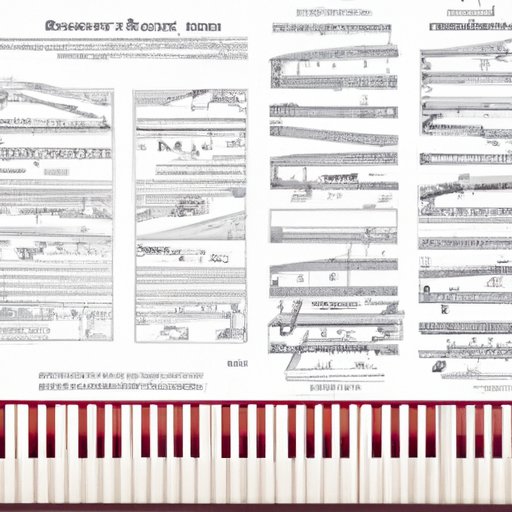
I. Introduction
Learning how to read piano sheet music is a daunting task for many beginners. However, with practice and patience, anyone can master this beautiful art form. In this tutorial, we will provide five simple steps to reading piano sheet music like a pro. We’ll also cover mnemonic devices to help you remember note names and symbols, beginner’s tips and tricks, and advanced concepts that will take your piano playing skills to the next level.
II. 5 Steps to Reading Piano Sheet Music Like a Pro
Reading sheet music can seem intimidating at first, but it becomes much easier with a little bit of practice. The five steps to reading sheet music are as follows:
1) Understanding the staff
The staff is the foundation of sheet music, consisting of five horizontal lines and four spaces. Each line and space represents a note on the piano, and these notes can move upwards or downwards to create melodies. Make sure you understand the structure of the staff before moving on to the next step.
2) Identifying Notes and Rests
Each note and rest symbol represents a specific length of time that the note is played. Different symbols can indicate a whole note, half note, quarter note, or eighth note, and more. Practice identifying these symbols until you can quickly recognize each one.
3) Key Signature
The key signature tells us which notes are sharp or flat throughout the song. This is important as it can significantly affect the entire melody.
4) Time Signatures and Rhythm
Time signatures tell us how many beats are in each measure. This is important for keeping the rhythm of the song. Counting out loud, or using a metronome, is helpful in keeping the rhythm and tempo of a song.
5) Putting it all Together
After you understand and practice each step, it’s time to put everything together. Play the song slowly at first, focusing on keeping the rhythm, accurately identifying and playing each note.
III. Mastering Piano Sheet Music in One Easy Lesson
Mnemonic devices can help you quickly remember note names and symbols. A common mnemonic device is to use words such as “Every Good Boy Does Fine” to remember the line notes, EGBDF, on the treble (top) clef. Another device you can use for the spaces on the treble clef is “FACE”. For the bass (bottom) clef, the line notes are “Good Boys Do Fine Always”- GBDFA, and the space notes are “All Cows Eat Grass.”
IV. A Beginner’s Guide to Reading Piano Sheet Music: Tips and Tricks
If you’re a beginner just starting to learn how to read sheet music, there are plenty of tips and tricks to help you succeed. Firstly, understand the basics before diving into advanced pieces. Secondly, practice regularly and focus on perfecting individual steps before moving on to more advanced concepts. Thirdly, don’t be afraid to make mistakes and learn from them. Lastly, find music that you enjoy playing to keep you motivated.
V. Piano Sheet Music Reading for Absolute Beginners: Start Playing Today
To get started, it’s important to understand the basics of sheet music, including the staff, clefs, notes, and rests. Once you’re familiar with these concepts, you can begin learning simple songs, such as “Mary Had a Little Lamb” or “Twinkle, Twinkle, Little Star”. Lastly, practice regularly to continue improving your piano skills.
VI. Reading Piano Sheet Music: A Comprehensive Guide for Any Skill Level
For those who want to take their piano skills to the next level, understanding advanced concepts such as chord progressions, scales, and arpeggios is crucial. Proper finger placement, posture, and hand position also play important roles in playing advanced sheet music. The key is practice and perseverance, taking on each new component step by step to achieve mastery.
VII. Conclusion
In conclusion, reading piano sheet music is a skill that takes time and practice to master. By following the five steps, using mnemonic devices to remember notes and symbols, practicing regularly, and learning from mistakes, anyone can become a pro at it. However, the most important part of learning to play the piano is to enjoy the process and the beautiful music that comes with it.




